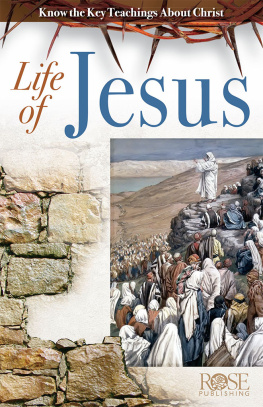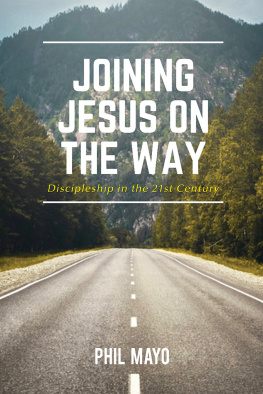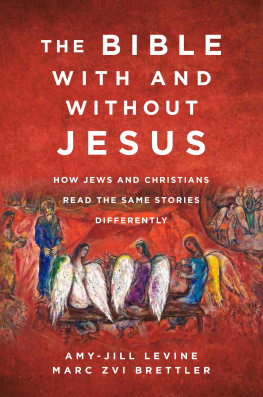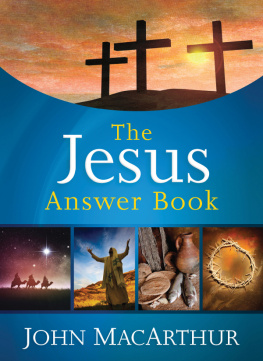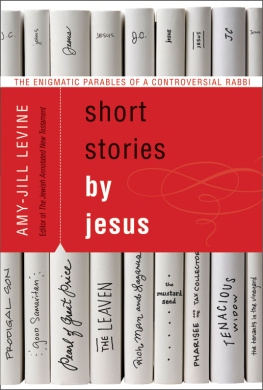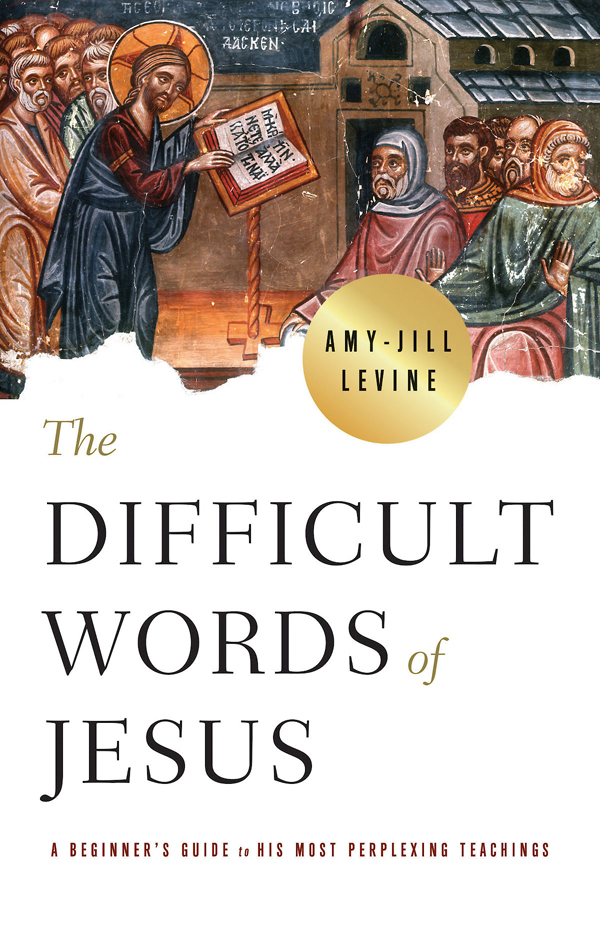The Difficult Words of Jesus
The Difficult Words of Jesus
A Beginners Guide to
His Most Perplexing Teachings
The Difficult Words of Jesus
978-1-7910-0757-7
978-1-7910-0758-4 eBook
The Difficult Words of Jesus: DVD
978-1-7910-0761-4
The Difficult Words of Jesus: Leader Guide
978-1-7910-0760-7
978-1-7910-0761-4 eBook

Also by Amy-Jill Levine
Entering the Passion of Jesus
A Beginners Guide to Holy Week
Light of the World
A Beginners Guide to Advent
Sermon on the Mount
A Beginners Guide to the Kingdom of Heaven
AMY-JILL LEVINE
The
DIFFICULT
WORDSof
JESUS
A BEGINNERS GUIDE to HIS MOST PERPLEXING TEACHINGS

The Difficult Words of Jesus
A Beginners Guide to
His Most Perplexing Teachings
Copyright 2021 Amy-Jill Levine
All rights reserved.
No part of this work may be reproduced or transmitted in any form or by any means, electronic or mechanical, including photocopying and recording, or by any information storage or retrieval system, except as may be expressly permitted by the 1976 Copyright Act, the 1998 Digital Millennium Copyright Act, or in writing from the publisher. Requests for permission can be addressed to Rights and Permissions, The United Methodist Publishing House, 2222 Rosa L. Parks Blvd., Nashville, TN 37228-1306 or e-mailed to .
Library of Congress Control Number: 2021938766
978-1-7910-0757-7
Scripture quotations unless noted otherwise are from the New Revised Standard Version Bible, copyright 1989 National Council of the Churches of Christ in the United States of America. Used by permission. All rights reserved worldwide. http://nrsvbibles.org/
Scripture quotations marked (KJV) are from The Authorized (King James) Version. Rights in the Authorized Version in the United Kingdom are vested in the Crown. Reproduced by permission of the Crowns patentee, Cambridge University Press.
Scripture quotation from THE MESSAGE copyright 1993, 1994, 1995, 1996, 2000, 2001, 2002 by Eugene H. Peterson. Used by permission of NavPress. All rights reserved. Represented by Tyndale House Publishers, Inc.
Scripture quotation from the Good News Translation in Todays English Version-Second Edition 1992 by American Bible Society. Used by Permission.
21 22 23 24 25 26 27 28 29 3010 9 8 7 6 5 4 3 2 1
MANUFACTURED IN THE UNITED STATES OF AMERICA
With love to Maria Mayo,
editor and friend,
and her son Walter,
as they go forward into the next generation
of wrestling with difficult words.
CONTENTS
INTRODUCTION
Addressing Difficult Passages
All Scriptures have passages with which people of conscience wrestle, and all liturgies at one time or another make proclamations that members of the congregation question. The role of a religious community is not to be like sheep, despite all the sheep and shepherd metaphors in both the Jewish and Christian Bibles. Without casting any aspersions on sheep (one of Gods creatures, although not necessarily the brightest), we can have better career aspirations than to become better bleaters. Since the name Israel traditionally means to wrestle with God, we do well to wrestle with passages that confuse and disturb us. More, we do well to wrestle with passages that have and can continue to cause harm.
Our Difficult Sayings
This book looks at six major verses as well as several others that have confused, confounded, and in some cases harmed. We start with questions of economics, an issue in antiquity as it is today. Is everyone to sell what you own, and give the money to the poor, and you will have treasure in heaven (so Mark 10:21)? What did Jesus mean when he said, It is easier for a camel to go through the eye of a needle than for someone who is rich to enter the kingdom of God (Mark 10:25)? The chapter opens questions of stewardship, community responsibilities, vocations, and even asset management.
Questions of economics necessarily relate to questions of families. In , we address Jesuss comment, Whoever comes to me and does not hate father and mother, wife and children, brothers and sisters, yes, and even life itself, cannot be my disciple. Whoever does not carry the cross and follow me cannot be my disciple (Luke 14:26-27). To understand this difficult saying as well as a number of others related to it, we need to understand what discipleship may have looked like in the first century, what taking up the cross would have signaled, and how Jesus reconfigured what we would call family values.
The household in antiquity was more than just father and mother and wife and children and brothers and sisters: many households, especially in the Roman world, included slaves. The topic of slavery in the Bible usually finds its focus in the so-called household codes, such as Ephesians 6:5-8, Slaves, obey your earthly masters with fear and trembling, in singleness of heart, as you obey Christ; not only while being watched, and in order to please them, but as slaves of Christ, doing the will of God from the heart. Render service with enthusiasm, as to the Lord and not to men and women, knowing that whatever good we do, we will receive the same again from the Lord, whether we are slaves or free. Yet slaves fully populate the Gospels, whether in parables or in households or even in the Passion narratives. Given our global history of slavery and how the toxicity of slavery on American soil continues to impact our lives, how are we to assess Jesuss instruction, Whoever wishes to be first among you must be slave of all (Mark 10:44)? Why is it that for some Christians, this image is helpful, but for others, it is impossible?
Our next difficult saying relates to another contemporary issue, that of insiders and outsiders, from church membership to citizenship to ethnic identity. Not only does Jesus instruct his disciples, Go nowhere among the Gentiles, and enter no town of the Samaritans, but go rather to the lost sheep of the house of Israel (Matthew 10:5b-6), he also refers to a Gentile woman (a Greek, Syro-Phoenician by birth in Mark; a Canaanite from the region of Tyre and Sidon in Matthew) as a dog, which then, as now, was an all-purpose rather than specifically ethnic insult. On the other hand, Matthews Gospel ends with what is known as the Great Commission, Matthew 28:19Jesuss command that his followers make disciples of all nations (or, perhaps all Gentiles). These passages and others raise questions of community definition as well as of the place of both universalism and particularism. When do we stress our common humanity, and when do we celebrate our distinct heritages? More, how does one evangelizeliterally to proclaim the good news of Jesusin an era of interfaith relations when people who are not Christians believe they have good news of their own or, worse, perceive Christian evangelism to be a sign of intolerance and therefore bigotry?
In , we turn to what, at least in my anecdotal impression, may be the most problematic collection of statements attributed to Jesus. Not only does Jesus promote for his disciples the image of a slave, he also threatens them should they fail in their responsibilities: As for this worthless slave, throw him into the outer darkness, where there will be weeping and gnashing of teeth (Matthew 25:30). The threat of hell remains a concern for many, whether because they have done something they think is unforgivable or because they doubt some of the teachings of their church or because they fear a wrathful and arbitrary God or because they doubt that they are good enough for God. The fear of hell is pervasive, even in congregations that take a liberal approach to Scripture. How are we to assess the threats of final judgment, and how can we foster a faith based in love and joy rather than fear of punishment?


